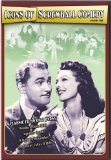| Reviews & Columns |
|
Reviews DVD TV on DVD Blu-ray 4K UHD International DVDs In Theaters Reviews by Studio Video Games Features Collector Series DVDs Easter Egg Database Interviews DVD Talk Radio Feature Articles Columns Anime Talk DVD Savant Horror DVDs The M.O.D. Squad Art House HD Talk Silent DVD
|
DVD Talk Forum |
|
|
| Resources |
|
DVD Price Search Customer Service #'s RCE Info Links |
|
Columns
|
|
|
Icons of Screwball Comedy: Volume 2 (Theodora Goes Wild, Together Again, The Doctor Takes a Wife, A Night to Remember)
Columbia Pictures (isn't that nice to read, rather than Sony?) has hit on a screwy, marvelous idea: scour their film vaults and look for some of their lesser-known (but still delightful) screwball comedies, and release them on DVD. After all, during the heyday of the screwball comedy, Columbia produced some heavyweight classics that helped define the genre (His Girl Friday, The Awful Truth, Twentieth Century, The More the Merrier, Holiday) - so why not rediscover something new/old, rather than watch The Awful Truth for the 80th time? The two-disc collection Icons of Screwball Comedy: Volume Two offers up icon of the genre Irene Dunne in 1936's Theodora Goes Wild (with fellow screwball icon Melvyn Douglas), and 1944's Together Again (with Love Affair co-star Charles Boyer), as well as two efforts starring Loretta Young: 1940's The Doctor Takes a Wife and 1942's A Night to Remember. At this low price, with more-than-adequate transfers and a few bonuses like trailers and a cartoon, I don't see how you could resist picking up Icons of Screwball Comedy: Volume Two (even if a couple of the films are less-than-ideal examples of the genre). Let's look very briefly at each film.
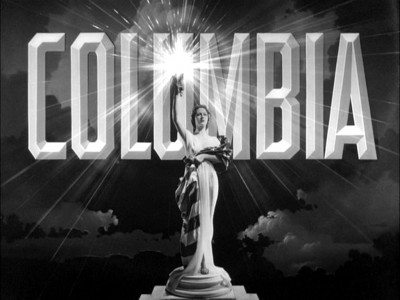
DISC ONE
THEODORA GOES WILD
In Lynnfield, Connecticut ("The Biggest Little Town in Connecticut"), trouble is brewing over at the local paper, The Lynnfield Bugle. Editor Jed Waterbury (Thomas Mitchell) has serialized The Sinner, a scandalous, hot-blooded novel by the mysterious, never-seen author, Caroline Adams. This shocking invasion of the new "modern morality" into quiet, staid (and musty) Lynnfield outrages the local Literary Circle, headed-up by prim, repressed sisters Aunt Mary Lynn (Elisabeth Risdon) and Aunt Elsie Lynn (Margaret McWade), and mean, gossipy Rebecca Perry (Spring Byington). Theodora Lynn (Irene Dunne), Sunday school teacher and last in the Lynn line, reluctantly expresses her disappointment in Jed's serialization, as well...because her Aunts tell her to do so. Rebecca's outraged cablegram to the book's New York publisher, Arthur Stevenson (Thurston Hall), does little more than elicit chuckles from the jaded publisher (scandal = book sales), but it doesn't amuse the author Caroline Adams...who just happens to be the same Theodora Lynn! Ashamed and guilty when she hears her own words read out loud at the Literary Circle, Theo is mortified that her small town and family will discover she's Caroline Adams.
Determined not to write again, Theo is further annoyed by the appearance of Michael Grant (Melvyn Douglas), the illustrator of her books. Flippant Michael flops down in Arthur's office and states flatly that Theo/"Caroline" certainly doesn't match up to her image as a "wild child" of passion, a notion that Theo corrects somewhat when she gets drunk with Arthur, his inquisitive wife, Ethel (Nana Bryant), and an uninvited Michael at a smorgasbord dinner (she even gets to rumba with him). Unfortunately for Theo, though, it's up to Michael to escort her to her train when Arthur has to take a sick Ethel home - an opportunity that Michael takes full advantage of when he tries, with comedic intent, to seduce her in his well-appointed Art Moderne apartment. The so-called "experienced" Miss Adams turns out to be the terrified, inexperienced Miss Lynn, and she bolts for Connecticut. But Michael is in hot pursuit, following her to Lynnfield, and blackmailing her into letting him work as her gardener (for more laughs), until things become serious for the soon-to-be lovers - a little too serious for Michael, in fact, who bolts back to New York when Theo tells him she loves him. And it's going to take Theo "going wild" in the Big Apple to win him back.
SPOILERS ALERT!
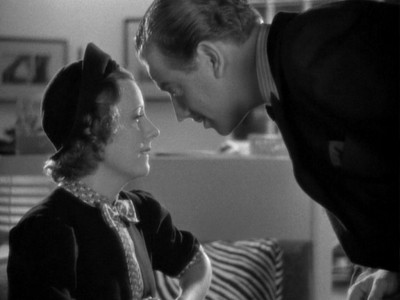
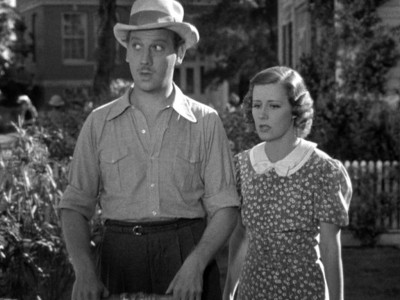
A beautiful, sweet, hilarious screwball comedy. I confess I've never seen Theodora Goes Wild; I'm far more familiar with Dunne's other efforts in the genre (including Together Again on this disc), so this first foray for her into screwball was an absolutely delightful surprise. It would be easy to just rhapsodize about Dunne for several paragraphs and end the review, such is the continued appeal of this performer (Dunne is one of those extremely rare actresses who, through her charm and personality, can make a viewer - even 73 years later - actually feel a little bit lovesick watching her). But so much more "works" in Theodora Goes Wild that to focus solely on her would be a disservice to this marvelous movie.
Taking place, naturally, in Connecticut, the screwball comedy nexus of the universe, Theodora Goes Wild worked best for me when it stayed in the small, gossipy Lynnfield, and when it showed the initial daffy, antagonistic courting of Dunne and Douglas. Directed by comedy newcomer Richard Boleslawski (the Polish-Russian émigré who helped bring "the Method" to America, and who worked in a wide variety of genres), and scripted by one-man classics writer Sidney Buchman (The Sign of the Cross, Holiday, Mr. Smith Goes to Washington, Here Comes Mr. Jordan, The Talk of the Town), Theodora Goes Wild employs all the classic rowdy conventions of the screwball genre - a "meet cute" that leads to an improbable, almost hostile courting between opposites; ridiculous, farcical plot machinations; disguised identities and secrets held; lightning-fast banter laced with sexual innuendo; out-and-out slapstick moments, the male in the equation resisting marriage, and getting bested by his female pursuer; and a freer, more modern moral code clashing with an older, stuffier tradition - while essaying a sweet Capra-esque small-town romance that I found utterly beguiling (a feeling aided, of course, by the magical Dunne and Douglas). The script moves at breakneck speed, with Buchman employing a neatly symmetrical balancing of the revelations and then destructions of first Theo's then Michael's "secret identities" (Michael, we learn, is part of a loveless marriage he maintains to satisfy his image-conscious politician father), leaving plenty of time in-between for their romance (which is believable - not always the case in screwballs), and for digs at both small-and-big town America.
Everyone is a big, fat phony in Theodora Goes Wild. Theodora not only lies to her community and family every day when she fails to reveal she's hot-to-trot writer Caroline Adams, she also lies to her readers (and herself) by passing herself off as "experienced," when she decidedly is not. She dons a third pose when she embraces her wild-yet-fake "Caroline Adams" persona in New York, playing up the vamp/homewrecker aspects to the voracious press, when in reality she's entirely innocent, with her act designed to pay Michael back for his blackmail. Michael has a ball putting on Theo's aunts as the loudmouthed, uncouth, disrespectful gardener, but he's also fooling Theo when he makes her fall in love with him when he's already married. He further has to play a role as the anonymous lover of "Caroline Adams," keeping his true identity secret so as not to upset his father and wife (who also plays at this charade to maintain her upscale life). The townspeople of Lynnfield - specifically the old biddies of the Literary Circle/Moral Vigilante Group - express outrage at excerpts read aloud from Adams' book...as they lean forward to catch every juicy, salacious detail, while even sweet, innocent Adelaide Perry (Rosalind Keith), the pregnant daughter of mean gossip Rebecca, has lied to her mother about being married (her husband skipped out during a tiff), and further lies about working in New York while she's actually staying with Theo's rascally Uncle John, played by Robert Greig (only newspaperman Jed - a modernizing force seeking to wake up Lynnfield from it's "20 year sleep" sees all the situations for what they truly are: fodder to sell more newspapers).
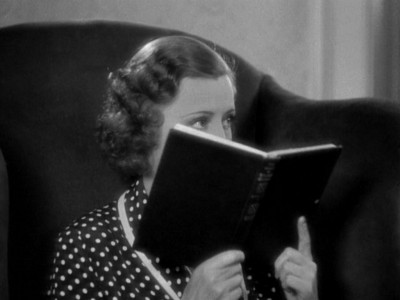
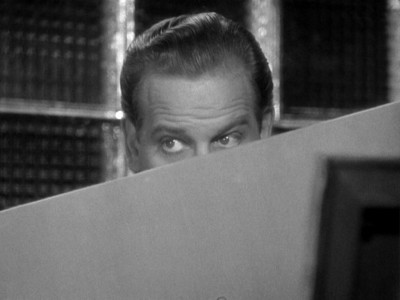
And of course, with all that duality infusing the narrative, there's plenty of opportunity for frantic farce and symbolism (Michael wanting to "tend" Theo's "garden" speaks for itself) and romantic misunderstandings. Boleslawski is as adept at getting across hilarious physical gags (Dunne's funny drunk-and-rumba scene, with that comical laugh of hers; Michael's yard mowing - complete with stray mutt hitched up as mule) as he is smoothly presenting the logically blocked-out seduction scene in Michael's apartment (as Buchman's jokes become more weighted with meaning, Michael's pursuit of Theo becomes tighter and more successful). And Boleslawski can't resist throwing in some good old fashioned Russian montage for symbolic effect when he shows the gossiping old bags on the grape vine, spreading the news about Theo, intercut with shots of their cats licking their chops. But what struck me most about Buchman's script and particularly Boleslawski's sensitive direction, was the sweet nature of the comedy - and the romance - even when morals and traditions were being tweaked. I would imagine most viewers today would point to the film's best gag - Dunne stepping off the train at Lynnfield with Adelaide's baby in her arms, her horrified Aunts almost having heart attacks - as evidence of the screenwriter and director puncturing small-town prejudices and narrow-mindedness. And of course, that's true. But watch the way Boleslawski and Buchman go further with the gag: the town of Lynnfield continues with the parade (the town isn't really outraged with Theo at all, nor do they care that she evidently has a baby out of wedlock, they assume). And Theo's Aunts turn from disapproving prudes to defensive relatives, supporting Theo (they decry the "narrow-minded town"). There's compassion here in the comedy, an acceptance that allows for transgression (even a fake one), made palatable by love and family.
Most importantly, the romance element of Theodora Goes Wild is believable, a feeling you don't always get with some of the more frenetic, mechanical examples of the genre. In an amazing scene filled with nuance, Michael spends his first night out in the tool shed at Theo's and the Aunt's home, whistling constantly in an effort to annoy them...which works also as a siren call to Theo (she's irritated with him for blackmailing her, but she's also attracted to his defiance of social conventions). Theo responds by singing Be Still My Heart in an effort to silence him, but also as a warning to herself not to fall for this dangerous man. Later, Boleslawski shoots several bucolic scenes with Theo and Michael falling in love (even if they don't know it yet), where they pick blackberries, or go trout fishing (she bests the man here), or building a smoky fire. These scenes, although comically designed (Michael almost chokes on blackberries, and he plays the rest of the scene with his face smeared black), feel very romantic, with incandescent Dunne (adorable in that Huckleberry Finn hat) responding eight different ways to Douglas' smooth operator (Boleslawski takes the broad gag of smoke getting into Dunne's eyes, and turns it tender with Douglas kissing away her tears). These earlier scenes have an almost poetic temper to them that's missing from the later, more predictable New York sequences, but they're enough to give Theodora Goes Wild heart, and that's not always the norm with this genre. One of my new favorites of the genre.
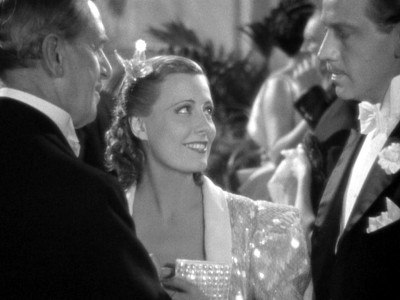
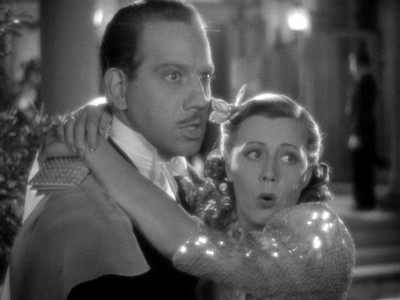
TOGETHER AGAIN
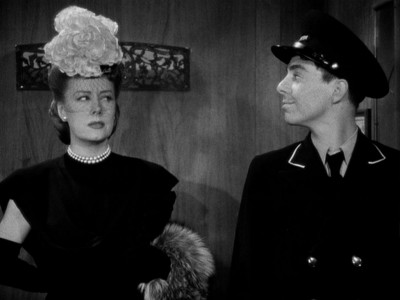
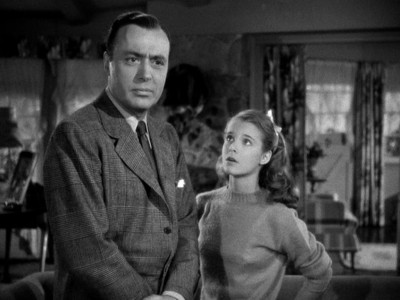
In a small little town outside of New York City, teenager Diana Crandall (Mona Freeman) asks her date, Gilbert Parker (Jerome Courtland), for a moment alone with her father after the memorial service. And by "father" she means the statue of the late Jonathan Crandall, the former mayor of the town who died five years ago, and by "memorial service," she means the town's yearly pilgrimage to the statue to pay honor to her father Jonathan...a ritual of respect as well as a stopgap to keep the emotionally volatile Diana from going off the deep end. Diana's stepmother, Anne (Irene Dunne), is now the mayor, and with her father-in-law, Jonathan, Sr. (Charles Coburn), Anne navigates the choppy waters of bringing up her highly-sensitive, slightly wacky step-daughter, while she wiles away her mundane widowed life in the sleepy, backward town.
A fortuitous bolt of lightning to the head of Jonathan Crandall's statue seems to spell the end of the Crandall's reign over the town - or at least that's what family enemy Morton Buchanan (Charles Dingle) wants when the statue is destroyed. But Anne, who was relieved as well when she thought the statue was coming down, digs in her heels (to assuage Jonathan, Sr. and Diana), and decides to engage a New York sculptor for an even bigger monument. However, meeting George Corday (Charles Boyer) at his NYC studio proves as momentous to the seemingly in-control beauty as the thunderbolt strike to Crandall's head. George quickly turns Anne's head with his fast patter and his off-setting ideas, and before she knows it, she's hooked. So she lams it back to Smallsville, with George not far behind.
SPOILERS ALERT!
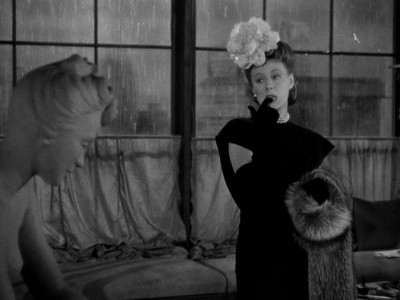
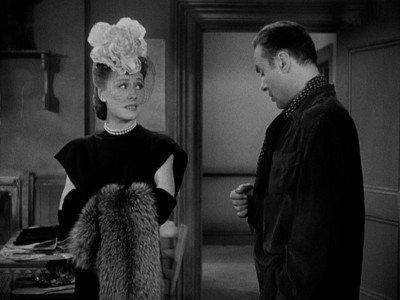
Entirely pleasant and amusing, but it stops short of being a classic. Together Again is never mentioned with the greats of the genre (some critics would say that's because screwball's heyday had already ended by 1944), and it's not nearly as well known as the stars' Love Affair, which still plays as fresh today as it did when it came out during Hollywood's greatest year, 1939. It's not that Together Again outright fails - far from it. But individual scenes work better alone; they never quite jell into a complete aesthetic expression that transcends the basic genre conventions it utilizes. Scripted by F. Hugh Herbert and Virginia Van Upp (one of Harry Cohn's most trusted screenwriters - she wrote for Cohn's most valuable asset, Rita Hayworth), there are several moments that show the genre (and the world) through the feminine perspective (Dunne proclaiming confident single women terrify that "vanishing race" of men; Carl "Alfalfa" Switzer confidently proclaiming that all women are actors annoyed by the attention they seek from men, and saddened when it disappears), as well as themes that are more stock (the notion that artists, bohemians and big city folks see small towns as populated by emotionally "small," closed-off people). Herbert's and Van Upp's script revolves around the kismet of those perhaps-directed lightening bolts, with the central section of the film cleverly structured around Anne's first meeting with George, her calamitous visit to Leonardo's Club (where she's busted in a raid with her clothes off), the subsequent picture of her in the newspaper (her face conveniently obscured except for her distinctive hat), and her race back to the seeming safety of her small home town...with George in blackmailing pursuit. The clunkiness of the final act may stem from scene-cutting during production, but the material is there for a classic in the genre.
Perhaps, then, Together Again suffers from the facile but unoriginal hand of one of Columbia's most serviceable directors, Charles Vidor. A serviceable director will get you a serviceable comedy, and that's precisely what Together Again is; had it had a director like Theodora Goes Wild's Boleslawski at the helm (who unfortunately died shortly after Theodora, it's possible the material could have been transcended by the directorial treatment. The film's setup may seem improbable, but then again, that's the territory of farce and screwball: ridiculousness reigns supreme in that insane world. But every element has to be exactly right in screwball - the performances, the transitions in the script, the one-liners, the editing - for the resulting movie to feel organic, and not just merely mechanical. And unfortunately, Together Again feels bolted together more than it feels free-flowing.And that's a shame because many individual sequences and elements work so well. Dunne, perhaps a tad more subdued here in this later outing, still manages several standout moments in Together Again. Certainly her tango with Boyer to Julio Cesar "Lenny" Sanders' Adios, Muchachos (later to better known in its English-language version as I Get Ideas is a highlight, with Dunne's close-up as Boyer moves her confidently around the floor a master class in silent acting. As Boyer holds her close, her veiled face shows how uncomfortable she is with his familiarity, fading into pleasure as the music and the experience washes over her, fading yet again into anxiety as she realizes just how pleasurable this unwanted experience is to her (my god these performers could act back then). Other wonderful bits of business and scenes include Dunne comparing her own body to that of the nude sculpture in Boyer's studio (I love it when she pats her own behind dismissively), or her romantic interlude with Boyer, in the rain, under a Cupid's fountain, as he tells her he loves her. Or Boyer's and Dunne's very funny "shushing" scene at Diana's recital concert (Coburn's drunken "So sue me" scene is terrific, too, and Mona Freeman hits a couple of exceedingly funny spots with her almost-crazy portrayal). Boyer, whom I always thought shined best in comedy, is delightfully loose and charming here, too, getting plenty of laughs as he effortlessly woos the recalcitrant-yet-weakening Dunne. And while Together Again does satisfy on a basic entertainment level, it fades from memory quickly, especially when put in context next to the true classics of the genre.
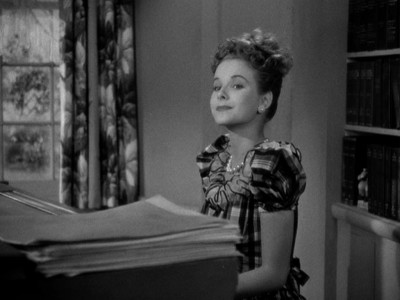
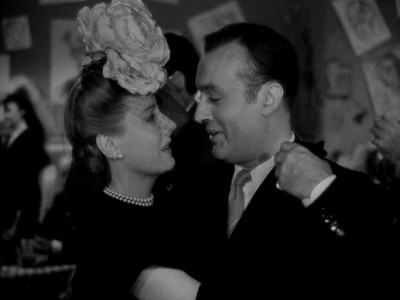
DISC TWO
THE DOCTOR TAKES A WIFE
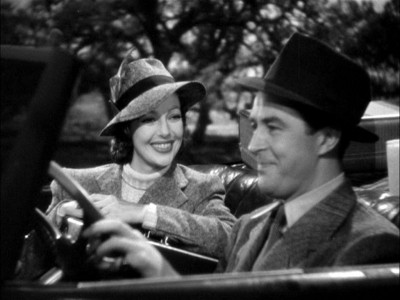
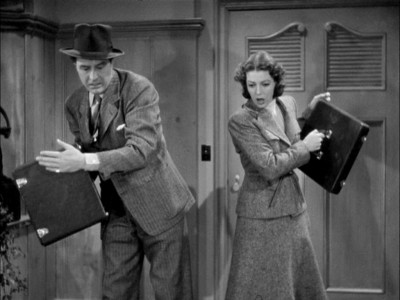
Author June Cameron (Loretta Young) has a new big hit entitled, Spinsters Aren't Spinach, a self-help book for single women that one customers describes as: "the book that tells you how to put men in their place." Her New York City publisher, John R. Pierce (Reginald Gardiner), is extremely pleased with the number of copies flying off the shelves, so he calls June back from her vacation in Massachusetts so she can work on a sequel. Unable to get a taxi to the train station at Lakewood Lodge, June manages to scam a ride from vacationing neuropsychiatrist Dr. Timothy Stirling (Ray Milland) - after she has a fight with him while he's trying to make a long-distance phone call. Things don't go much better for the bickering travelers as she learns he thinks her books are trash, and that he believes women are physically, emotionally, and intellectually inferior to men. A stop in Greenwich, Connecticut so Tim can send a telegram proves disastrous for them both: a kid mistakenly puts a "Just Married" sign on Tim's car (instead of on a newly-married couple's car; the wedding chapel is right next to the cable office). Soon everyone is spotting the famous, formerly single author driving around in her "Just Married" honeymoon car, and the daggers come out from the readers who feel betrayed by their feminist hero.
Back in New York, June and Tim are stunned by the rapid turn of events as reporters try and get the scoop on their non-existent marriage. Sensing disaster for his cash cow, publisher John - who also happens to be June's boyfriend - devises a plan: let the two pretend to be married while June switches gears and pens a pro-marriage primer. Then, once it's done, they can get a fake Reno divorce and no one will be the wiser. Tim rejects this notion - he already has a fiancé, Marilyn (Gail Patrick), who's none too understanding about the news reports - but once he finds out that he's been given that professorship that has eluded the $100-a-month instructor (the Dean of the college prefers the maturity of married professors), he reluctantly agrees to the deception. Naturally, living in close quarters in June's well-appointed NYC apartment, the bickering continues...but so does a growing attraction between the ill-matched pair.
SPOILERS ALERT!
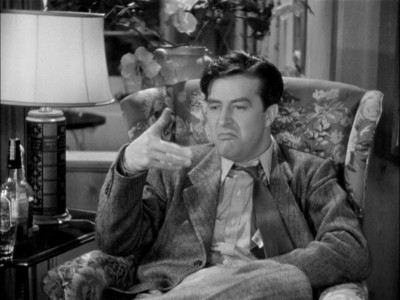
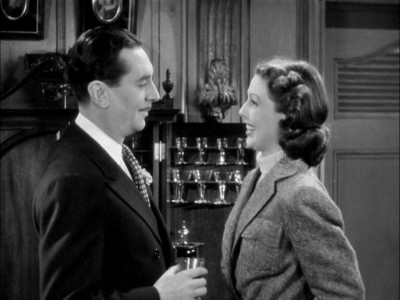
In my previous review for Together Again, I wrote about how each element of a screwball farce had to be just so for the film to transcend from merely mechanical, to organic and free and inspired. Unfortunately, "mechanical" is the very definition of the minor screwball, The Doctor Takes a Wife. And the blame for this situation rests primarily with the lead actors here. Not that the rest of The Doctor Takes a Wife works very well, either. George Seaton's and Ken Englund's script never offers any unexpected delights or surprises with either its overly-familiar situations or its so-so one-liners, while some of the basic conventions of screwball are either flubbed or altered - and not for the better. In particular, the couple's "meet cute" scene - a critical moment for the audience's acceptance of what's to come - is poorly constructed and staged (they get into a fight because Young is complaining too loudly about not getting a ride to the train station, while Milland is trying to talk to his father, Edmund Gwenn, in a wasted role), not helped by Milland's total inability to take a convincing pratfall (he blows another slapstick moment later on when he falls trying to put on his pants). Arbitrary plot devices - almost the norm in screwball comedies - are fine if they possess at least a thin semblance of logic or if they're woven into the plot with care, but the use of the football players to bounce John around seems an half-hearted afterthought. No better is the seeming "missing" scene of Milland and Young going to spend the weekend with Burkhardt (the barely-seen Edward Van Sloan). Of course, the couple's detour to the poor rural family sets up their eventual romance (and June's reawakening to domesticity), but it plays very anti-climatic when they just drive back to NYC, saying there isn't time to go away for the weekend (was this scene cut during the production? It would seem a perfect opportunity to created gags with the couple pretending to be married while Milland shills for his job).
That return to domesticity for June is also a big let down for The Doctor Takes a Wife because in screwball, it always seems the most interesting women characters, the ones that are the funniest and the sexiest, are those that, although they may pretend to be the "weaker" sex, deferring to the male, they in fact totally control the situation...and the doltish, weaker, "feminized" male. But Young's later desire to bake cookies for Milland after she beams when she hears the cries of the baby delivered at the farm, seems far too conventional for a genre that prides itself on challenging the more traditional gender expectations that were rigidly enforced in other movie genres. All of these missteps may have been transcended had different actors starred, but there's no getting around the fact that Young and Milland (superior in other formats and other films), are not particularly strong in this genre. I've never been a fan of Loretta Young; I find her in most cases to be fairly arch and stiff - and that's a disaster for comedy. Apparently, Young took The Doctor Takes a Wife because after quitting Fox over Darryl Zanuck's mishandling of her career, she faced an industry blacklist that Columbia's tyrannical-but-oddly-endearing mogul Harry Cohn broke...provided he got her services on the cheap. She hadn't worked for a year prior to taking this project on, so perhaps that explains her overly eager, over-emphatic performance here (lots of arm-waving and mugging for the camera). Milland, another actor not exactly known for his comedic skills, is far too grumpy for this kind of piffle, and while he does manage to get some laughs from the film's only flat-out funny scene (where Young hides down at the bottom of his car, tickling his legs as he tries not to react in front of his fiancé), the rest of the time he's thrashing about, trying to imitate the master of the genre, Cary Grant (Milland's funny walk when he's wearing the too-small hat is right out of Bringing Up Baby) with a decidedly dyspeptic look on his face. All in all, The Doctor Takes a Wife isn't unfunny; it's lightly amusing in spots (particularly when the roster of great Columbia supporting regulars pop up for a second or two of screen time). But nothing about it feels original or special, nor does it ever achieve that indescribable "lift off" sensation when a comedy transcends its own bounds.
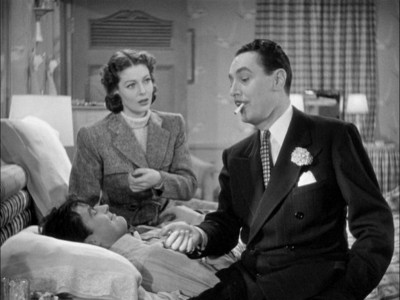
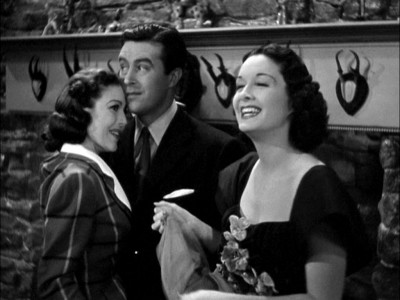
A NIGHT TO REMEMBER
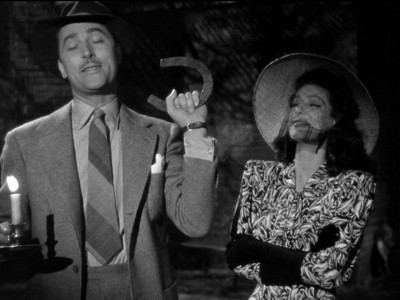
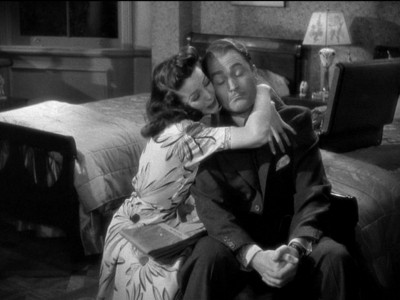
Mystery writer Jeff Troy (Brian Aherne) has his hands full when he sees the creepy dump his wife, Nancy (Loretta Young), has rented for their new apartment in Greenwich Village, NYC. If the place isn't suspect enough with its dark, moldering look, things that go crawling along people's feet in the basement, and its sinister-acting landlord Mr. Turner (Eddie Costello), the frightened reaction by Nancy's old friend Anne (Jeff Donnell), who also lives at 13 Gay Street, is enough to have Nancy wondering what she's gotten herself and her seemingly oblivious husband into this time. Deciding to wait out the furniture movers who will be coming later in the evening - and because the apartment is totally dark with the electricity still off - the couple go to a neighborhood restaurant, where the proprietor, slatternly Polly (Lee Patrick), is also acting highly suspicious, particularly when she discovers the Troys are living in her building. Overhearing hulking, violent-looking Louis Kaufman (Cy Kendall) arranging a meeting with someone at their basement apartment, Nancy goads Jeff into taking action...which results in a pummeling for Jeff and a later bump-off for Louis - who's dumped in Nancy's and Jeff's garden. Who are the people who live at 13 Gay Street, and what are they afraid of? Who killed Louis, and who's looking to kill Jeff and Nancy, too? Will Jeff solve the mystery, or will he faint again?
SPOILERS ALERT!
While there are elements of screwball within A Night to Remember, it's a stretch to say it's a bona fide addition to the canon. Certainly the weak male character of Jeff Troy is recognizable as a screwball element, with his reluctance to face danger and his "sensitive" nature, as Nancy describes it. And the wisecracking back-and-forth between the couple does sound like screwball...although to be fair, wisecracks in American comedies was the norm during this period, regardless of the subgenre. However, I can't find much else in A Night to Remember that points towards screwball, particularly since there's no protracted "battle" between the couple, nor separation or "remarriage" for them, or misunderstandings about their marital status from outsiders or a community of eccentrics, nor disguised identities for the couple, nor exaggerated or flat-out ridiculous plot machinations to overcome. On the contrary, A Night to Remember is much more of the "dark house" comedy/mystery spookums genre associated with comedians like Bob Hope, Abbott & Costello, Martin and Lewis, The Three Stooges or the Bowery Boys. Most of the scenes take place at night, within heavy shadow, and the simple comedy comes from things that go bump in the night (like the ever-present "Old Hickory" turtle that everyone keeps stumbling over), rather than any protracted battle of the sexes or marital discord. Indeed, Jeff's and Nancy's marriage seems solid throughout the film, so where's the element of tension provided by screwball's stock situation of having couples break up, or bicker back together?
I've already written about Young in the previous review (she has even less to do here than in The Doctor Takes a Wife; her part could have been played by any Columbia contract player), but I must say I enjoyed Aherne's slightly goofy performance here. Looking a little bit like Errol Flynn, the big, capable Aherne is amusing at times when he's ducking any physical confrontation (he also has a very funny bit where he tries to make a pot roast dinner), and he hits the mark, more or less, in finding the right tone between playing it straight and playing it for laughs (a tough line to walk). But there's no getting around the fact that A Night to Remember is really "B" movie material, at best (screenwriters Richard Flournoy and Jack Henley worked on the popular, funny Blondie "Bs"), with whatever slight amusements it provides coming from simple "Boo!" scare tactics and not really much else - and certainly not from screwball. It's inclusion here on the Icons of Screwball Comedy: Volume Two is interesting but questionable.
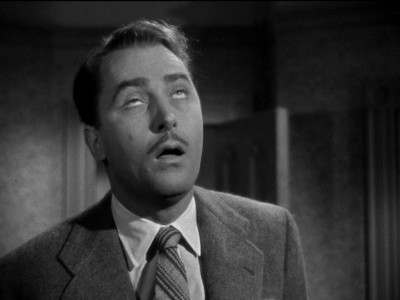
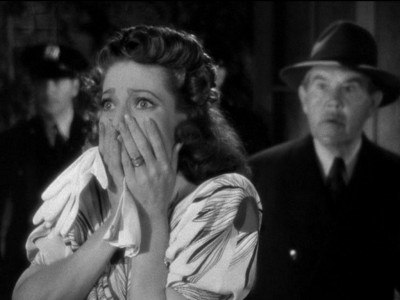
The DVDs
The Video
Of all the full-frame, 1.33:1 black-and-white transfers gathered here on the Icons of Screwball Comedy: Volume Two, Theodora Goes Wild looks the best here, with a beautifully-modulated gray scale that captures that shimmering high keylight look that was so prevalent at the time. A Night to Remember also looks quite good, with solid blacks and a sharpish picture, but both Together Again and The Doctor Takes a Wife looked dark to me, with soft pictures. Grain is big factor with all of these transfers, particularly Theodora Goes Wild, but it's to be expected. Compression issues were not a factor. All in all, these look quite good.
The Audio
The Dolby Digital English mono audio tracks are certainly no more than you would expect for these kinds of films, and they do the job adequately. All dialogue is heard correctly, but hiss is noticeable. English subtitles and close-captions are available.
The Extras
Original trailers are included for all titles except Together Again, while the Color Rhapsody cartoon, Mad Hatter is tacked on, as well. Not a wealth of extras, but considering the price of this four-film collection, not a bad set of bonuses.
Final Comments
I'd recommend Icons of Screwball Comedy: Volume Two for the sublime Theodora Goes Wild alone; Irene Dunne is delicious in this beautifully shot, carefully-constructed screwball farce. So the rest of the films are gravy, as far as I'm concerned. Together Again has quite a few good moments (and it's great to see Dunne and the wonderfully funny Boyer together again), while The Doctor Takes a Wife and A Night to Remember are less-successful but essentially innocuous entertainments. And I must commend Sony and Columbia for putting out these hard-to-find library titles in value-packs such as the Icons of Screwball Comedy: Volume Two (unlike say, Warners, which apparently has relegated the majority of its library titles to its direct-mail program...with a blanket hefty fee per film). I highly recommend Icons of Screwball Comedy: Volume Two. Paul Mavis is an internationally published film and television historian, a member of the Online Film Critics Society, and the author of The Espionage Filmography.


|
| Popular Reviews |
| Sponsored Links |
|
|
| Sponsored Links |
|
|
| Release List | Reviews | Shop | Newsletter | Forum | DVD Giveaways | Blu-Ray | Advertise |
|
Copyright 2024 DVDTalk.com All Rights Reserved. Legal Info, Privacy Policy, Terms of Use,
Manage Preferences,
Your Privacy Choices | |||||||









